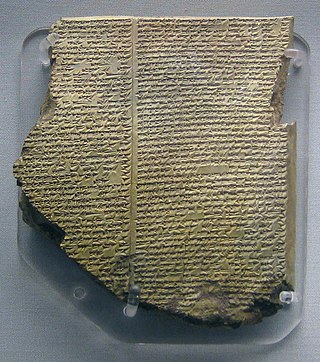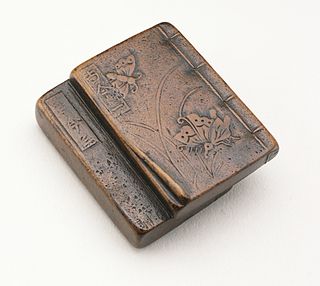Technicians of the Sacred: A Range of Poetries from Africa, America, Asia, Europe and Oceania is a book of spiritual writings and poetry collected from around the world. Compiled by Jerome Rothenberg 1969. ISBN 978-0-520-04912-3.
Technicians of the Sacred: A Range of Poetries from Africa, America, Asia, Europe and Oceania is a book of spiritual writings and poetry collected from around the world. Compiled by Jerome Rothenberg 1969. ISBN 978-0-520-04912-3.

An epic poem, or simply an epic, is a lengthy narrative poem typically about the extraordinary deeds of extraordinary characters who, in dealings with gods or other superhuman forces, gave shape to the mortal universe for their descendants.

Haiku is a type of short form poetry that originated in Japan. Traditional Japanese haiku consist of three phrases composed of 17 phonetic units in a 5, 7, 5 pattern; that include a kireji, or "cutting word"; and a kigo, or seasonal reference. However, haiku by classical Japanese poets, such as Matsuo Bashō, also deviate from the 17-on pattern and sometimes do not contain a kireji. Similar poems that do not adhere to these rules are generally classified as senryū.
In poetry, metre or meter is the basic rhythmic structure of a verse or lines in verse. Many traditional verse forms prescribe a specific verse metre, or a certain set of metres alternating in a particular order. The study and the actual use of metres and forms of versification are both known as prosody.

Poetry is a form of literary art that uses aesthetic and often rhythmic qualities of language to evoke meanings in addition to, or in place of, literal or surface-level meanings. Any particular instance of poetry is called a poem and is written by a poet. Poets use a variety of techniques called poetic devices, such as assonance, alliteration, euphony and cacophony, onomatopoeia, rhythm, and sound symbolism, to produce musical or incantatory effects. Most poems are formatted in verse: a series or stack of lines on a page, which follow a rhythmic or other deliberate pattern. For this reason, verse has also become a synonym for poetry.

Robert Lee Frost was an American poet. His work was initially published in England before it was published in the United States. Known for his realistic depictions of rural life and his command of American colloquial speech, Frost frequently wrote about settings from rural life in New England in the early 20th century, using them to examine complex social and philosophical themes.

Sappho was an Archaic Greek poet from Eresos or Mytilene on the island of Lesbos. Sappho is known for her lyric poetry, written to be sung while accompanied by music. In ancient times, Sappho was widely regarded as one of the greatest lyric poets and was given names such as the "Tenth Muse" and "The Poetess". Most of Sappho's poetry is now lost, and what is extant has mostly survived in fragmentary form; only the Ode to Aphrodite is certainly complete. As well as lyric poetry, ancient commentators claimed that Sappho wrote elegiac and iambic poetry. Three epigrams formerly attributed to Sappho are extant, but these are actually Hellenistic imitations of Sappho's style.

A poetry slam is a competitive art event in which poets perform spoken word poetry before a live audience and a panel of judges. While formats can vary, slams are often loud and lively, with audience participation, cheering and dramatic delivery.

Thomas Stearns Eliot was a poet, essayist and playwright. He is considered to be one of the 20th century's greatest poets, as well as a central figure in English-language Modernist poetry. His use of language, writing style, and verse structure reinvigorated English poetry. He is also noted for his critical essays, which often reevaluated long-held cultural beliefs.
Prose is the form of written language that follows the natural flow of speech, a language's ordinary grammatical structures, or typical writing conventions and formatting. Thus, prose includes academic writing and differs most notably from poetry, where the format consists of verse: writing formatted in lines, which traditionally follow rhythmic metre or a rhyme scheme. The word "prose" first appeared in English in the 14th century. It is derived from the Old French prose, which in turn originates in the Latin expression prosa oratio.

Modern lyric poetry is a formal type of poetry which expresses personal emotions or feelings, typically spoken in the first person.

Dame Carol Ann Duffy is a Scottish poet and playwright. She is a professor of contemporary poetry at Manchester Metropolitan University, and was appointed Poet Laureate in May 2009, and her term expired in 2019. She was the first female poet, the first Scottish-born poet and the first openly lesbian poet to hold the Poet Laureate position.

Chinese poetry is poetry written, spoken, or chanted in the Chinese language, and a part of the Chinese literature. While this last term comprises Classical Chinese, Standard Chinese, Mandarin Chinese, Yue Chinese, and other historical and vernacular forms of the language, its poetry generally falls into one of two primary types, Classical Chinese poetry and Modern Chinese poetry.

In book publishing, an anthology is a collection of literary works chosen by the compiler; it may be a collection of plays, poems, short stories, songs, or related fiction/non-fiction excerpts by different authors.

Spoken word is an oral poetic performance art that is based mainly on the poem as well as the performer's aesthetic qualities. It is a 20th-century continuation of an ancient oral artistic tradition that focuses on the aesthetics of recitation and word play, such as the performer's live intonation and voice inflection. Spoken word is a "catchall" term that includes any kind of poetry recited aloud, including poetry readings, poetry slams, jazz poetry, pianologues, musical readings, and hip hop music, and can include comedy routines and prose monologues. Unlike written poetry, the poetic text takes its quality less from the visual aesthetics on a page, but depends more on phonaesthetics, or the aesthetics of sound.

Persian literature comprises oral compositions and written texts in the Persian language and is one of the world's oldest literatures. It spans over two-and-a-half millennia. Its sources have been within Greater Iran including present-day Iran, Iraq, Afghanistan, the Caucasus, and Turkey, regions of Central Asia, South Asia and the Balkans where the Persian language has historically been either the native or official language. For example, Rumi, one of the best-loved Persian poets, born in Balkh or Wakhsh, wrote in Persian and lived in Konya, at that time the capital of the Seljuks in Anatolia. The Ghaznavids conquered large territories in Central and South Asia and adopted Persian as their court language. There is thus Persian literature from Iran, Mesopotamia, Azerbaijan, the wider Caucasus, Turkey, Pakistan, Bangladesh, India, Tajikistan and other parts of Central Asia, as well as the Balkans. Not all Persian literature is written in Persian, as some consider works written by ethnic Persians or Iranians in other languages, such as Greek and Arabic, to be included. At the same time, not all literature written in Persian is written by ethnic Persians or Iranians, as Turkic, Caucasian, Indic and Slavic poets and writers have also used the Persian language in the environment of Persianate cultures.

Japanese poetry is poetry typical of Japan, or written, spoken, or chanted in the Japanese language, which includes Old Japanese, Early Middle Japanese, Late Middle Japanese, and Modern Japanese, as well as poetry in Japan which was written in the Chinese language or ryūka from the Okinawa Islands: it is possible to make a more accurate distinction between Japanese poetry written in Japan or by Japanese people in other languages versus that written in the Japanese language by speaking of Japanese-language poetry. Much of the literary record of Japanese poetry begins when Japanese poets encountered Chinese poetry during the Tang dynasty. Under the influence of the Chinese poets of this era Japanese began to compose poetry in Chinese kanshi); and, as part of this tradition, poetry in Japan tended to be intimately associated with pictorial painting, partly because of the influence of Chinese arts, and the tradition of the use of ink and brush for both writing and drawing. It took several hundred years to digest the foreign impact and make it an integral part of Japanese culture and to merge this kanshi poetry into a Japanese language literary tradition, and then later to develop the diversity of unique poetic forms of native poetry, such as waka, haikai, and other more Japanese poetic specialties. For example, in the Tale of Genji both kanshi and waka are frequently mentioned. The history of Japanese poetry goes from an early semi-historical/mythological phase, through the early Old Japanese literature inclusions, just before the Nara period, the Nara period itself, the Heian period, the Kamakura period, and so on, up through the poetically important Edo period and modern times; however, the history of poetry often is different from socio-political history.

Romantic poetry is the poetry of the Romantic era, an artistic, literary, musical and intellectual movement that originated in Europe towards the end of the 18th century. It involved a reaction against prevailing Enlightenment ideas of the 18th century, and lasted approximately from 1800 to 1850. Romantic poets rebelled against the style of poetry from the eighteenth century which was based around epics, odes, satires, elegies, epistles and songs.
Arabic poetry is one of the earliest forms of Arabic literature. Pre-Islamic Arabic poetry contains the bulk of the oldest poetic material in Arabic, but Old Arabic inscriptions reveal the art of poetry existed in Arabic writing in material as early as the 1st century BCE, with oral poetry likely being much older still.

A poet is a person who studies and creates poetry. Poets may describe themselves as such or be described as such by others. A poet may simply be the creator who creates (composes) poems, or they may also perform their art to an audience.

The Poet Laureate Consultant in Poetry to the Library of Congress, commonly referred to as the United States Poet Laureate, serves as the official poet of the United States. During their term, the poet laureate seeks to raise the national consciousness to a greater appreciation of the reading and writing of poetry. The position was modeled on the Poet Laureate of the United Kingdom. Begun in 1937, and formerly known as the Consultant in Poetry to the Library of Congress, the present title was devised and authorized by an Act of Congress in 1985. Appointed by the Librarian of Congress, the poet laureate's office is administered by the Center for the Book. For children's poets, the Poetry Foundation awards the Young People's Poet Laureate.